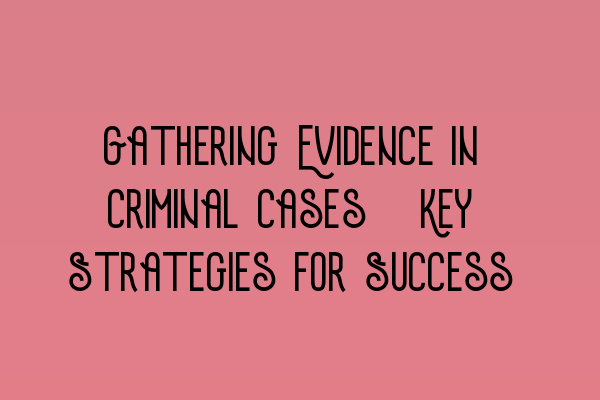Gathering Evidence in Criminal Cases: Key Strategies for Success
When it comes to criminal cases, gathering evidence is crucial for building a strong defense or securing a conviction. The ability to collect and analyze evidence effectively can make or break a case. In this article, we will explore some key strategies for gathering evidence in criminal cases.
1. Conduct Thorough Investigative Work
One of the first steps in gathering evidence is conducting thorough investigative work. This includes conducting interviews, reviewing documents, and collecting physical evidence. By thoroughly investigating the case, you can identify potential witnesses, uncover additional evidence, and establish a solid foundation for your defense or prosecution.
In order to conduct effective investigative work, it is important to have a clear understanding of the relevant laws and regulations surrounding the case. This will help you identify the types of evidence that can be admissible in court and ensure that your gathering methods are legally sound.
2. Utilize Technology and Forensic Tools
The advancement of technology has greatly impacted the way evidence is gathered in criminal cases. From DNA analysis to digital forensics, there are a variety of tools and techniques that can be used to collect and analyze evidence.
By utilizing these technologies and forensic tools, you can uncover hidden evidence, trace digital footprints, and enhance the overall strength of your case. It is important to stay up-to-date with the latest advancements in technology and utilize them effectively to gather evidence.
In addition, partnering with experts in various fields such as forensic science or cybercrime investigation can provide valuable insight and expertise in gathering and presenting evidence.
3. Establish Chain of Custody
In order for evidence to hold up in court, it is essential to establish a clear chain of custody. This means documenting every step of the process, from the initial collection of evidence to its presentation in court.
By establishing a chain of custody, you can ensure that the integrity of the evidence is maintained and that it hasn’t been tampered with or compromised. This can strengthen the credibility of the evidence and enhance its admissibility in court.
4. Collaborate with Witnesses and Experts
Witnesses can play a crucial role in gathering evidence in criminal cases. By collaborating with witnesses, you can gather firsthand accounts, statements, and testimonies that can strengthen your case.
Additionally, experts in various fields can provide valuable insights and analysis of the evidence. Whether it’s a forensic expert, a medical professional, or a technical specialist, their expertise can help in interpreting complex evidence and presenting it convincingly in court.
5. Document and Organize Evidence Effectively
Proper documentation and organization of evidence is essential for presenting a strong case. This includes taking detailed notes, photographs, videos, and creating an organized system to store and manage the evidence.
By documenting and organizing the evidence effectively, you can easily locate and retrieve specific pieces of evidence when needed. This ensures that no crucial evidence is overlooked or misplaced during the course of the case.
Conclusion
Gathering evidence in criminal cases is a complex process that requires careful planning, attention to detail, and a thorough understanding of the legal landscape. By following these key strategies, you can increase the chances of success in building a strong defense or securing a conviction.
For more resources and preparation materials related to criminal law and practice, check out these articles:
- SQE 1 Practice Exam Questions
- SQE 1 Practice Mocks FLK1 FLK2
- SQE 2 Preparation Courses
- SQE 1 Preparation Courses
- SRA SQE Exam Dates
